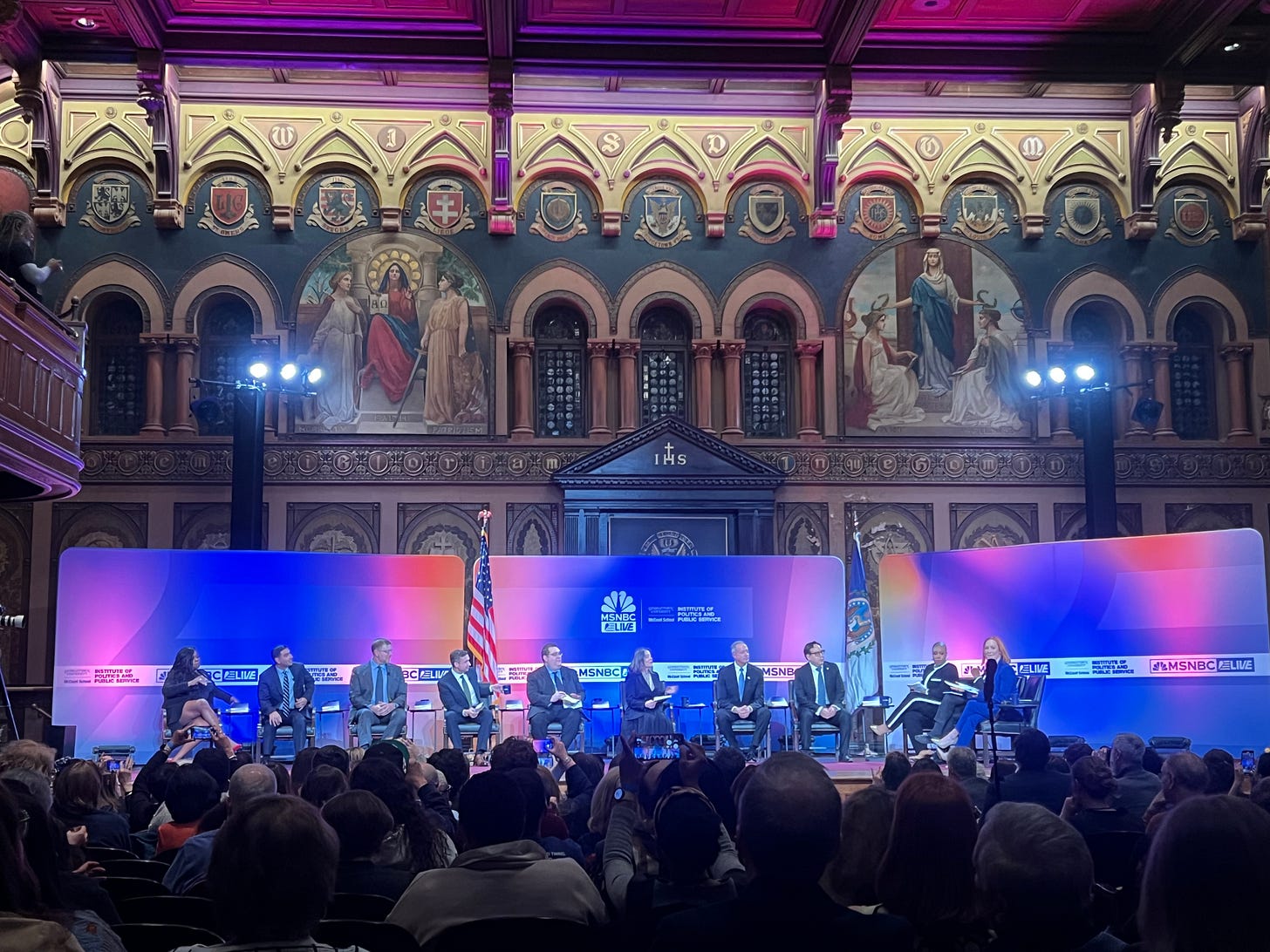David Hogg: The Phones Are Dooming Democrats
How Democrats lost the Covid generation.
Around this time eight years ago, many Democrats were confused and demoralized after Donald Trump’s initial victory. But they thought they had a secret weapon up their sleeve: the future.
America’s youngest voters — Generation Z — was held up as the cohort that was going to save Democrats from oblivion. “I think the younger generation today is probably the most progressive young generation in the history of this country,” Bernie Sanders said during Trump’s first term. “This is a generation which is profoundly anti-racist, anti-sexist, anti-homophobic, anti-xenophobic, and anti–religious bigotry.”
Teenagers and young adults would be so appalled by Trump, the thinking went, that Democrats might secure an electoral advantage for years to come.
Fast forward to 2025, and few Democrats are telling themselves that today. According to data by Tufts University, Kamala Harris won 18- to- 29-year-olds in the 2024 election — but only by four percentage points, a sharp swerve to the right compared to Joe Biden’s 29-point win among the age group in 2020.
A large part of the shift was fueled by young men, who went from voting against Trump by 14 percentage points in 2020 to voting for him by the same margin four years later. But young women swung significantly as well, from voting for Biden by 32 points to voting for Harris by 17 points.
David Hogg has watched this shift up close. He first rose to prominence in 2018 as a leader of the March for Our Lives, the rally for gun control held in the wake of a mass shooting that took place at Hogg’s high school in Parkland, Florida.
At the time, Democrats pointed to Hogg and his fellow March for Our Lives activists — and the historic youth turnout in the 2018 midterms that they were believed to have helped deliver — as a key piece of evidence for Gen Z’s supposed progressivism.
Now, Hogg is running to be Vice Chair of the Democratic National Committee (DNC) to tell the party they declared victory in the generational wars too early. “Young people do not trust the Democratic Party,” he told me in an interview Thursday, shortly after stepping off stage at Georgetown University for the final forum with his fellow candidates before DNC members pick their officers on Saturday.
But Hogg, 24, thinks that Gen Z has less shifted than bifurcated. Harris didn’t perform worse among young voters than Biden because a large chunk of the generation switched their vote, he said; instead, it was because of the new voters (around 15 million of them) who became eligible to cast ballots between 2020 and 2024.
Polls have shown stark differences between these youngest voters (ages 18 to 22) and their older Gen Z peers (ages 22 to 29) who thronged to the March for Our Lives and other protests in the first Trump term. And Hogg doesn’t think it’s some great mystery why: it all comes down to “whether or not you were in high school during Covid.”
“I understand why people weren’t able to have their prom or their graduation, right?” Hogg said. “It was well intentioned because we didn’t want people to die, but those are really important life moments for people. And to them, what they saw was chaos around the response to Covid, and even though it was Donald Trump implementing a lot of those policies, he still miraculously tagged Democrats with saying ‘that’s why all these things are happening.’”
At the same time, the pandemic also pushed younger voters more online, Hogg added, making a generation already struggling with mental health even lonelier — and more open to voting for whichever presidential candidate they felt “listens to them and fights for them because they’re in a lot of pain.”
Those are qualities that transcend policy views. “Young people would [rather not be] around somebody, even if they agree with them almost completely, if they feel constantly judged and like they’re walking on eggshells around that person, because they aren’t going to be perfect,” Hogg said. “You’re going to lose them, and they’re going to end up voting for the guy that doesn’t judge them, even if they don't completely agree with him.”
“For 30 years, Republicans were walking around with a giant stick up their ass about how morally superior there were on everything: gay marriage, drugs, everything like that,” Hogg continued. “And I would argue to some extent, they’re still trying to do that, but Donald Trump is so obviously not traditionally conservative, socially speaking…[that] what happened is there was a flip where Donald Trump now is seen as, like, the cool guy that’s not going to judge you, and is like a bro, in part because of their very effective use of influencers.”
“And we have become the ones with the moral superiority stick where it’s like, ‘you have to be good on this, you have to be good on that. You have to be all these things.’”
Hogg’s diagnosis aligns with political science research that suggests that the events that coincide with a voter’s upbringing are hugely influential in shaping their political behavior. The problem for Democrats: those events tend to stick with people for their entire voting life, in ways that make it hard to set them on a different political course.
At one point, musing about a potential solution, Hogg said that it might be “interesting for the Democratic Party to look into” efforts to encourage young people “to get off our phones more,” in order to combat the loneliness epidemic which he says has helped drive Gen Z in a Trumpward direction.
“Not to sound like a Boomer, but it’s true,” he said, even citing “modern Luddite movements in Brooklyn and other places” that are encouraging young people to power off their smartphones.
But when I asked if that meant Democrats should be embracing proposed bills to curb phone usage, Hogg quickly clarified: “I think that would make us lose the youth vote by 30 points this time,” pointing to the party’s “massive fuck-up” around the TikTok ban.
The fix should be more “cultural” than legislative, he explained, including messaging to convince Gen Z that tech CEOs aren’t as “cool” as they think. “We need our young people to see them as the oligarchs that they are. ‘They don’t want you to hang out with your friends, because they want you to be online constantly.’ We need to frame this as an act of rebellion against the system.”
Of course, undoing an entire generation’s digital obsession will be easier said than done. In the meantime, throughout the DNC officer debates on Thursday, older Democrats seemed convince that their path back to political dominance ran through the online world.
After Hogg and his fellow vice chair candidates spoke, the candidates for DNC Chair took the stage at Georgetown, making their own closing pitches to an audience that was part-students, part-DNC members.
At the beginning of the forum, the chair candidates were asked if they believed the Democratic Party had effectively responded to Trump’s first 10 days in office. No one raised their hands.
But the contenders struggled to offer an alternative strategy for the next four years. The big idea — raised by all three of the leading contenders, Minnesota Democratic Party chair Ken Martin, Wisconsin Democratic Party chair Ben Wikler, and former Maryland Gov. Martin O’Malley — seemed to be set up an “information war room” to respond to Republican attacks on social media platforms.
The candidates kept repeating the proposal, but none clarified how the “24/7 war room” would be any different than the social media accounts the Democratic Party already has, or how it would succeed in reaching the more disengaged voters who Democrats have struggled to connect with.
At times, I felt like I had stepped into a time machine — not just because I felt like a student again, sitting in my alma mater, but also because Democrats seemed to be re-running most of their material from past campaign cycles. Despite the drubbing that identity politics took at the polls in November, several of the questions posed at the forum were about securing increased DNC representation for various identity groups.
When one DNC member asked if the candidates would commit to increasing the number of at-large committee seats given to transgender members, only one candidate — former Bernie Sanders campaign manager Faiz Shakir — declined to raise his hand. “I don’t like breaking out people by identity as the way in which we want to constitute the DNC,” Shakir said.
At another point, moderator Jonathan Capehart asked the candidates whether racism and misogyny played a role in Harris’ loss. Every hand went up. “That’s good. You all pass,” Capehart said approvingly. (Trump performed better among female and minority voters in 2024 than in past election cycles. Researchers have rejected the idea that voters systematically discriminate against female candidates.)
The party seemed stuck in the same old fights (the forum repeatedly descended into chaos as climate protesters interrupted the candidates) and speaking in the same bubble (despite multiple candidates referring to the importance of facing skeptical media outlets, the forum was moderated by former Biden press secretary Jen Psaki, former Harris press secretary Symone Sanders, and Capehart, a liberal columnist).
“I think we all agree we’re at a crisis point right now,” former Biden administration official Nate Snyder, another chair candidate, said. The party still seemed to be searching for a way out of it.





Very interesting. However, what I found missing was the youths (supposed?) concern for the environment. It's one thing to support someone who they find non-judgmental, it's a whole other thing to support that person who promises to drill, drill, drill, and who claims climate change is a hoax.
What this piece does not explain is the swing from more or less responsible government, liberal or conservative, to Trumpism, the blatant use of government to punish your foes and enrich yourself and your allies. Perhaps the problem is our two party system. If people, for what ever reason, have come to dislike one party the only choice is the other. A vibrant third party would be able to exert a lot of pressure on Democrats and Republicans, not so much by seizing power itself but by forcing compromise on the other two in order to gain its support. We have always dismissed the prospect of a third party because it would be so difficult for it to ever be ascendant. But perhaps it doesn’t need to be. Perhaps coalition politics is the way to go. I’d love a party sort of like the Dems but more pragmatic, without the heavy emphasis on identity politics and cancel culture, less of a scold. We wouldn’t win presidential elections but if there were enough of us we could definitely influence them.